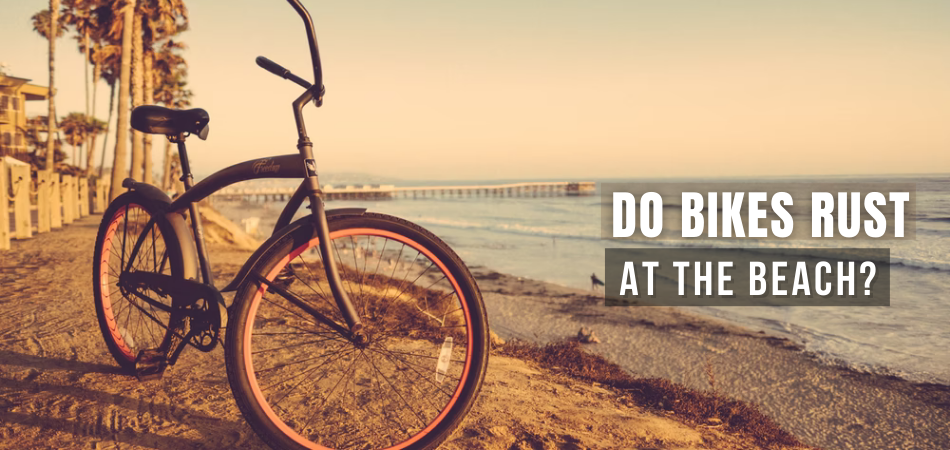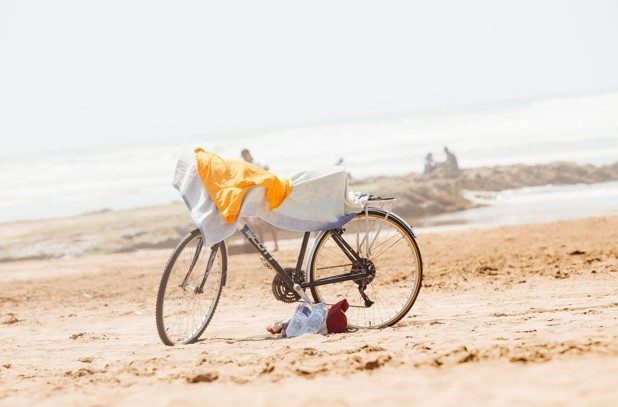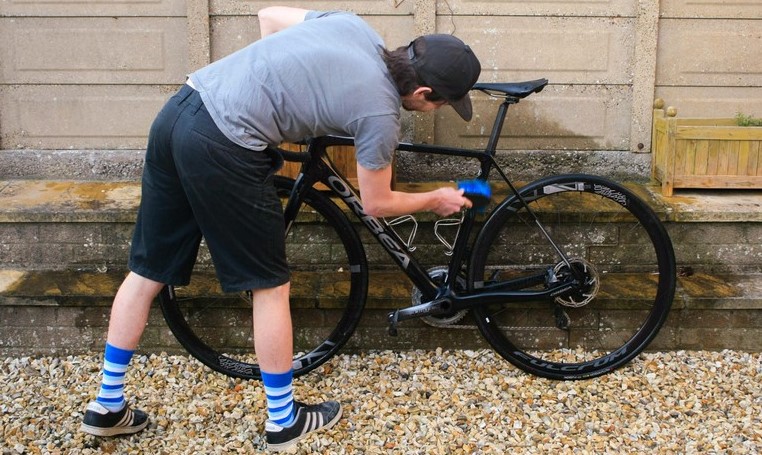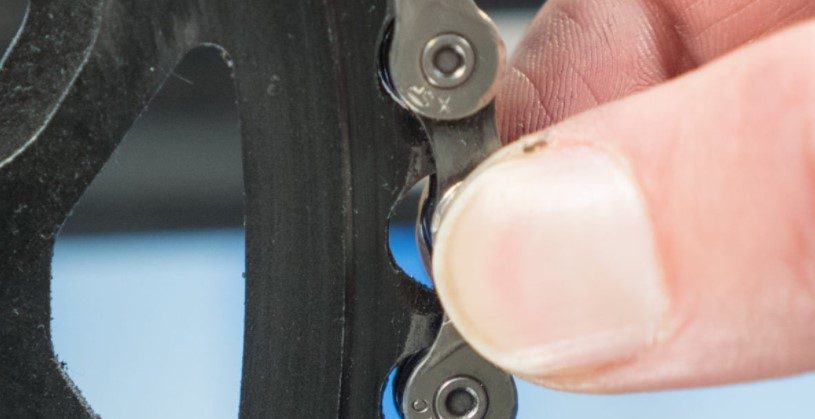Riding bikes along the beachfront in fresh morning air is one of life’s most satisfying experiences. While the scenery is breathtaking, the salty air will undoubtedly take its toll on the exposed metals of your bike if it is not maintained correctly. Fear not, because, on this page, I will explain how to keep a bike from rusting at the beach.
Keeping your bike rust-free requires a few easy maintenance procedures. You’ll have to wipe off the saltwater after each ride and thoroughly clean the sensitive parts of the bike. However, it’s best to use a layer of anti-rust spray over the bike’s frame for long-lasting protection.
Fortunately, the information in this article is geared toward ensuring that bikes remain rust-free for many years of enjoyment to come. But first, let’s start with the basics.
Do Bikes Rust At The Beach?
Unfortunately, YES, bikes may rust at the beach if not appropriately maintained. The most common reason for bicycles to rust is that someone failed to properly care for and protect the bicycles’ sensitive components.
But first, you need to understand why does metal rust.
When metal parts are exposed to the environment, specifically oxygen and moisture, it forms a type of residue we call rust. We often use the word iron-oxide instead of rust in formal terms, but it’s basically the same thing.

Now, before you tell me that because aluminum bikes do not contain iron, they do not rust, please listen to what I have to say first, and then we can discuss it. Iron can only become an iron-oxide if the following elements are present in sufficient quantities:
- Iron
- Water
- Oxygen
It is pretty standard for bicycles and bicycle components to rust after being abandoned and uncared for several years. If a bike and its steel or aluminum components stay exposed to water and oxygen, say saltwater, the bicycle will become obsolete.
So, whether bicycle rust at the beach depends on the exposure period and its maintenance. But the straight answer is that bikes can rust at the beachside.
What Type of Bike Does Not Rust at the Beach?
It entirely depends on the bike’s frame materials. Metals that are not protected by a protective coating of some sort will rust invariably over time. The following metals are the only ones that are resistant to rust:
- Stainless steel
- copper, bronze, or brass
- galvanized steel
- aluminum metal
You may have noticed that I used the term “rust-resistant” rather than “rust-proof.” According to this logic, just because one type of metal does not contain iron does not rule out the possibility of corrosion caused by other types of oxidizing reactions.
Aluminum, for example, is one of the metals that are most commonly used for bicycle parts since it is lightweight and inexpensive to manufacture. Even more intriguing is that aluminum alloys contain almost no iron at all, yet they are still capable of oxidizing. This means that aluminum can bond with oxygen and get eroded in the future.
Given these facts, it’s pretty easy to understand why bikes more easily get corroded or rusted on beach-sides. Air at the beach is pretty humid and contains a lot of moisture, which could easily react with the metals on your bike.
How To Keep Bike From Rusting At Beach?
If your bike has already gotten rusty, there are many ways to restore it. But as for keeping your bike free from rust, you may already know that prevention is better than cure.
You can keep your bike rust-free by wiping its frame, safeguarding it with proper solutions, and inspecting the parts which are most vulnerable to rusting, like the chains.
Below I’ll go through each of these methods, and then you can decide which one suits you the best.

Wipe off your Bike Frame
It’s best to take a damp washcloth and some warm water to clean your bike’s frame, wheel rims, and chain before you start to ride. However, saltwater can still cling to your frame even if you clean and store it properly. This is due to humidity, so it’s essential to clean it off before and after each ride.
Additionally, using a heavy blanket or a bicycle cover will help keep most of the moisture off your bike.

Safeguard your Bike Frame
Even though aluminum is a highly corrosion-resistant material, it does not rule out the possibility of rusting if left unattended for an extended time. To prevent iron oxide buildup, you should apply a good silicone spray once every month. Using these sprays, such as Prestone Silicone Spray, is an excellent way to help add an extra layer of protection to your bike’s frame.
Just be cautious about where you leave it to dry because dust can adhere to the silicon surface.
However, the inside of the frame is also susceptible to moisture damage. BOESHIELD T-9 is an excellent spray to keep rust at bay on the inside of your bike’s frame. You’ll also need to spray down the seat tube, top tubes, and bottom bracket section to ensure that everything is covered and protected from the weather and elements.
These sprays contain linseed oil which is widely popular for preserving steel frames from dust and water.
Inspect your chains
Even if you don’t live near a coastline, your chain will endure a lot of wear and tear over time. So it’s critical to keep up with routine maintenance.
A suitable sealant will provide a protective coating over the metal while also maintaining the lubrication of the chain and links. Again, Boeing’s Boeshield T9 sealant comes highly recommended in that case. This product prevents rust from forming on your chain, protects it from the elements, and effectively lubricates your cable joints.

All in all, it only takes a small amount of time and effort to keep your bike in good condition. And with the information provided in this article, it will take a lot more for coastal weather to cause your bike to break down. So take advantage of that beautiful view first thing in the morning, knowing that your bike is up to the challenge of whatever adventure awaits you.
If you haven’t quite decided what bike to buy for riding on beaches, try out my top picks of the best ebike for riding on sand. These electric bikes will save you more on maintenance efforts and be more fun!
Frequently Asked Questions (FAQs)
There are a lot of queries about the cleaning of bicycles. I have listed some below that might help you if cleaning rusting bikes is your concern.
Is it possible to remove rust stains with WD-40?
No. It is only effective in loosening rusted parts. As a result, do not attempt to remove any rust from your bike. Scrub the rust off of your bicycle with sandpaper or something similar to remove it.
How to remove rust from bikes without damaging the paint?
White vinegar will be extremely beneficial in this case. It only takes a simple wipe with a cloth soaked in vinegar and dipping smaller parts in a bowl filled with vinegar.
However, avoid soaking aluminum parts in vinegar for prolonged hours.
Is it possible for vinegar to corrode my bike?
The answer is yes. If you do not thoroughly wash your bike after using vinegar, it can cause corrosion to continue. Cleaning your bike with water will help to avoid this from happening.
Is it okay to leave rusting screws on my bike?
When in doubt, always exchange rusted screws because they may not be capable of holding everything together. Besides rusty screws may break into two pieces if not replaced immediately. If the screws are only slightly rusted, you can coat them with a protective layer of oil to prevent further corrosion.
Final Words
Having a location near the beach, which is a great place to ride, might make us exceptionally fortunate. The sun, the sand, and the salty sea air all combine to make for pleasant bike excursions. However, this humid and salty environment can bring deadly outcomes for your bike. Sand, water, and salt will cause your bike parts to rust over time if not cleaned properly.
Hopefully, this article on how to keep a bike from rusting at the beach answers all your questions. All in all, taking extra precautions can help you protect your bike from damage without having to forego all of the beach fun.

